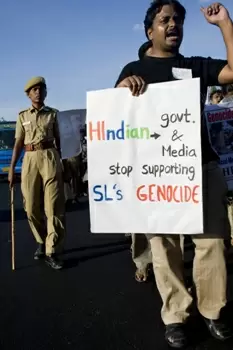Will Ban Ki-Moon act on the recommendations of the war crimes panel?

06-May-2011
Vol 2 | Issue 18
DESPITE Sri Lankan foreign minister GL Peiris warning UN Secretary-General Ban Ki-moon against releasing the war crimes report compiled by a panel of experts which inquired into abuse of human rights and crimes against humanity during the final days of the 26-year genocidal war in the island nation, it was released last week and the reaction was along expected lines.
Colombo has accused Ban of causing irreparable damage to the reconciliation efforts of President Mahinda Rajapaksa; the Sri Lankan leader showed his displeasure by organising the largest-ever demonstration on May Day to protest against the report. While the government of Rajapaksa is at the crest of popularity among the Sinhala masses, Sunday’s mobilisation only shows his paranoia.
The report has captured the last phase of the war in vivid detail without bias, in which about 40,000 Tamil civilians were killed. The report is based on eye-witness accounts and representations made by NGOs. It is now the responsibility of Ban and the international community to act on the recommendations of the panel to investigate and prosecute the culprits.
 |
|
Genocidal war: The UN report confirms the charges of war crimes against Sri Lanka that human rights groups have been making for several years (Photo: Save Tamil Movement)
|
Last year, the Permanent People’s Tribunal, an international body independent of any State authority, after examining evidence and hearing eye-witness accounts in Dublin, concluded the Sri Lanka government committed war crimes and crimes against humanity.
Though the UN panel did not use the word ‘genocide’ to avoid anyone asking why it was not stopped as required under Article 1 of the Genocide Convention, the acts of crime against humanity listed in the report appear to have been committed on racial and political grounds against the Tamil population of the Vanni region of Sri Lanka.
The murder of 7,000 Bosnian Muslim men and boys at Srebrenica in 1995, according to the International Court of Justice judgment of 26 February 2007, constituted genocide. The court observed, “You do not need six million exterminated people in order to constitute genocide.” The Sri Lankan government inexplicably expelled the International Committee of Red Cross from the Vanni, set up No Fire Zones to lure civilians there and treacherously opened artillery fire on them.
Both the government of Sri Lanka and the LTTE committed war crimes. The LTTE was liquidated and its entire leadership was wiped out in the closing days of the war. Government records show that 430,000 people were living in the Vanni in 2008. After the final days of the war, the government moved civilians into camps which held 290,000 people, according to UN statistics. The killings accounted for 40,000 people. The whereabouts of the remaining 100,000 are still not known except that a large number of people picked up in white vans simply disappeared without a trace.
It is heartening that strong voices have been raised against the Sri Lankan government in capitals across the world; but not in Beijing, Moscow and New Delhi.
The permanent representative of the USA to the UN said the report was a valuable contribution towards establishing justice, accountability, human rights and reconciliation in Sri Lanka. “We strongly support the Secretary-General’s call for the Sri Lankan authorities to respond constructively to the report and underscore our belief that accountability and reconciliation are inextricably linked,” it said.
Rajapaksa had said on many occasions that he was fighting India’s war against the LTTE. Without the active support and clandestine participation of India, Sri Lanka could not have wiped out the LTTE the way it did. Vishnu Prakash, spokesman of India’s external affairs ministry, said, “We intend to engage with the government of Sri Lanka on the issues contained in the report.” Whatever that might mean, India cannot absolve itself a degree of complicity.
Also Read
Report of the Expert Panel of the UN Secretary General angers Sri Lanka
Ground prepared for Mahinda Rajapaksa's tryst with destiny
Indian civil society’s conscience stirred for Lankan Tamils














